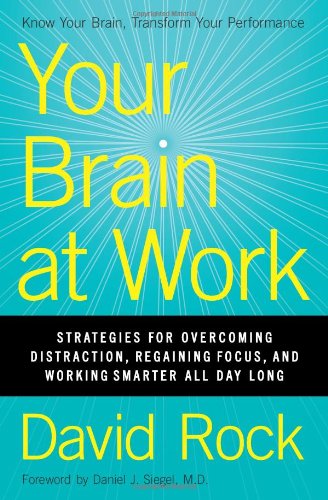The biggest factor in building and maintaining a productive working life in the midst of the digital deluge is the ability to focus. These three books all come at this subject in different ways and each has a valuable contribution to make.
 Focus: The Hidden Driver of Excellence.
Focus: The Hidden Driver of Excellence.
Daniel Goleman dedicated this book to “The well-being of generations to come,” and his passion to see us thrive is evident throughout. He argues that “while the link between attention and excellence remains hidden most of the time, it ripples through almost everything we seek to accomplish.” His thesis is “Attention works much like a muscle—use it poorly and it can wither; work it well and it grows.” His book is a work-out to develop and refine the muscle of our attention, and even rehab focus-starved brains.
Of the three books here, this one is the most technical as it deals in detail with some of the brain science behind what makes distraction so enjoyable, yet so destructive. However, don’t let that put you off. I found myself quickly scanning some of these denser passages and zeroing in on the more readable practical sections.
Some of the quotes were revolutionary for me. Try this one from Nobel prize-winning economist Herbert Simon: “Information consumes the attention of its recipients. Hence a wealth of information creates a poverty of attention.”
 Your Brain at Work: Strategies for Overcoming Distraction, Regaining Focus, and Working Smarter All Day Long
Your Brain at Work: Strategies for Overcoming Distraction, Regaining Focus, and Working Smarter All Day Long
Leadership Coach, David Rock, follows a fictitious couple (though all too real for many of us) as they live out their lives in the maelstrom of everyday life. The author describes and analyzes each day in the couple’s busy working lives and makes lots of practical suggestions about how to change each day for the better. As Rock’s main idea is that we can improve how we work by understanding how our brains work, he also pulls in a lot of brain science, but in a more accessible way than Focus.
You’ll never take it all in on one read, but what I’ve tried to do is take a couple of chapters at a time and then try to put some of the suggestions into practice for a few weeks before coming back to the book again. I’ve found myself thinking a lot more about just what I’ll spend my limited brain fuel on every day, in the process learning to drive more efficiently and enjoyably.
 Juggling with Elephants: An Easier Way to Get Your Most Important Things Done – Now!
Juggling with Elephants: An Easier Way to Get Your Most Important Things Done – Now!
Of the three books, this is the easiest and quickest to read (one hour should do it). The basic insight is that life is a three ring circus (the three circles are work, family, and personal life), and if we learn to think like a ringmaster, managing the various acts can be fun and easy. Some of the main points:
- The result of trying to juggle elephants is that no one, including you, is thrilled with your performance.
- The ringmaster cannot be in all three rings at once.
- The key to the success of the circus is having quality acts in all three rings.
- Intermission is an essential part of creating a better circus performance.
- There is no shortage of acts vying for the circus.
- Every act must have a purpose.
Although the book’s central idea might seem a bit simplistic, it’s imagery has had a lasting and profound effect on me. I find it much easier now to focus on one ring at a time, and give myself wholly to it, instead of continuing the elephant-juggling act, leaving me squashed and the elephants a little frustrated!
Pingback: The Secret to Spending Less Time on the Internet | Scripture Zealot blog